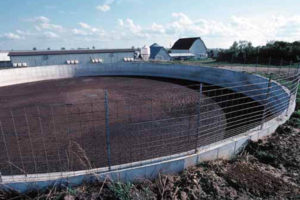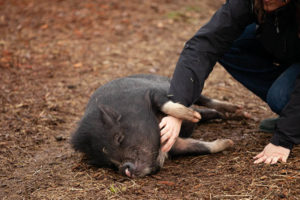By David Steele and Denise Swanson
Many question whether humans are ‘naturally’ herbivores or omnivores. The omnivore camp argues that our species evolved to eat both plantsand animals. Many others agree with Mahatma Gandhi that no, humansare natural herbivores.
This time, Gandhi was wrong.
Humans evolved eating a mix of plant and animal materials. The structure of our guts and the transporters therein and the arrangementand shapes of our teeth – not to mention the wealth of fossil evidence(arrowheads, butchered animal bones, etc.) going back literally millionsof years – all point to an omnivorous past.
Natural selection favored meat eating because it allowed our ancestorsto survive in the absence of reliable supplies of edible plants. Ourhunter-gatherer forebears could flourish on fruits and berries whenthose were plentiful and switch to meat when edible plants were scarce. Had early humans not led omnivorous lives, they almost certainlywould have died out.
Yet we have continued to evolve since then. Just 10,000 years ago, isolated bands of humans invented agriculture. Around the world, we began to grow crops and domesticate animals, which, for the most part, we raised to convert grasses to meat for us. Sometime later, a mutation arose in us and we could add animal milk to our adult diets as well. And for a very long time, we have flourished.
But things have changed.
In the past, humans were few and far between. The pressure we exerted on the creatures around us was slight. In contrast, with a population of about 7 billion people – headed towards 10 billion by mid-century – the pressures we exert today are enormous. Whereas meat eating allowed humanity to survive the harsh environments of the past, doing so is now well on the way to making the environment itself uninhabitable. It is no exaggeration to state that our hunger for meat is destroying the world.
In 2005, some 55 billion farm animals were killed for food. According to the UN Food and Agriculture Organization, worldwide meat consumption, ignoring fish, increased from 156 billion pounds in 1961 to 540 billion pounds in 2002. World population doubled and meat consumption increased nearly 4-fold.
The New York Times has reported on just how destructive this accelerating production of animal products can be. As China switches from a largely soy-based diet to meat, paradoxically their demand for soy is skyrocketing. In today’s factory farms, it takes 2.4 lbs of corn, soy and oats to produce a pound of chicken, 8-10 lbs of similar feed is required for every pound of beef. Chinese demand for meat has led to a doubling of Brazilian soy exports – at a cost of huge swaths of the Amazon rainforest.
Meat production pollutes enormously. The Union of Concerned Scientists has shown that animal agriculture is second only to transportation in the pollution it causes. Twenty tons of manure is produced for every household in the United States.
And meat production accelerates global warming. According to the UN Food and Agriculture Organization, animal agriculture is the number one worldwide source of global warming gases. More than transportation, more than electrical generation.
Natural selection operates on the here and now. In the past, the ability to eat meat was a boon to us. But today, the opposite is true. If we don’t dramatically curtail our consumption of animal products, our planet will become a wasteland; natural selection will soon select in the strongest way against our meat-eating habits.
We’re lucky. We evolved as omnivores. We can choose what we eat. Plants or animals. Choose plants.
The survival of not only our species but of much of the planet is at stake.
Photo by Diana Polekhina on Unsplash




